Eric Burdon & The Animals – Winds of Change
The ‘60s were an incredible time of social upheaval, experimentation, change. Anything was possible — any artist could borrow inspiration from anything that had come before. The old rules had to be thrown out. Revolution was the order of the day. Rock ’n’ roll groups could do pretty much anything they wanted, and in 1967, they did. Some of it was amazing, some of it was horrifying, and a lot of it was incredibly self-indulgent.
It wasn’t any different for Eric Burdon and the new group of musicians that were being called The Animals. The new band had already produced a single (“When I Was Young,” backed with “A Girl Named Sandoz”) that had been included on the “Best Of . . . Vol. II” earlier that year. Definitely a solid start in a more expansive direction — as one would expect when the flip side of the group’s first single is a love song to LSD. (On the other hand, it was 1967, and most songs were love songs to LSD).
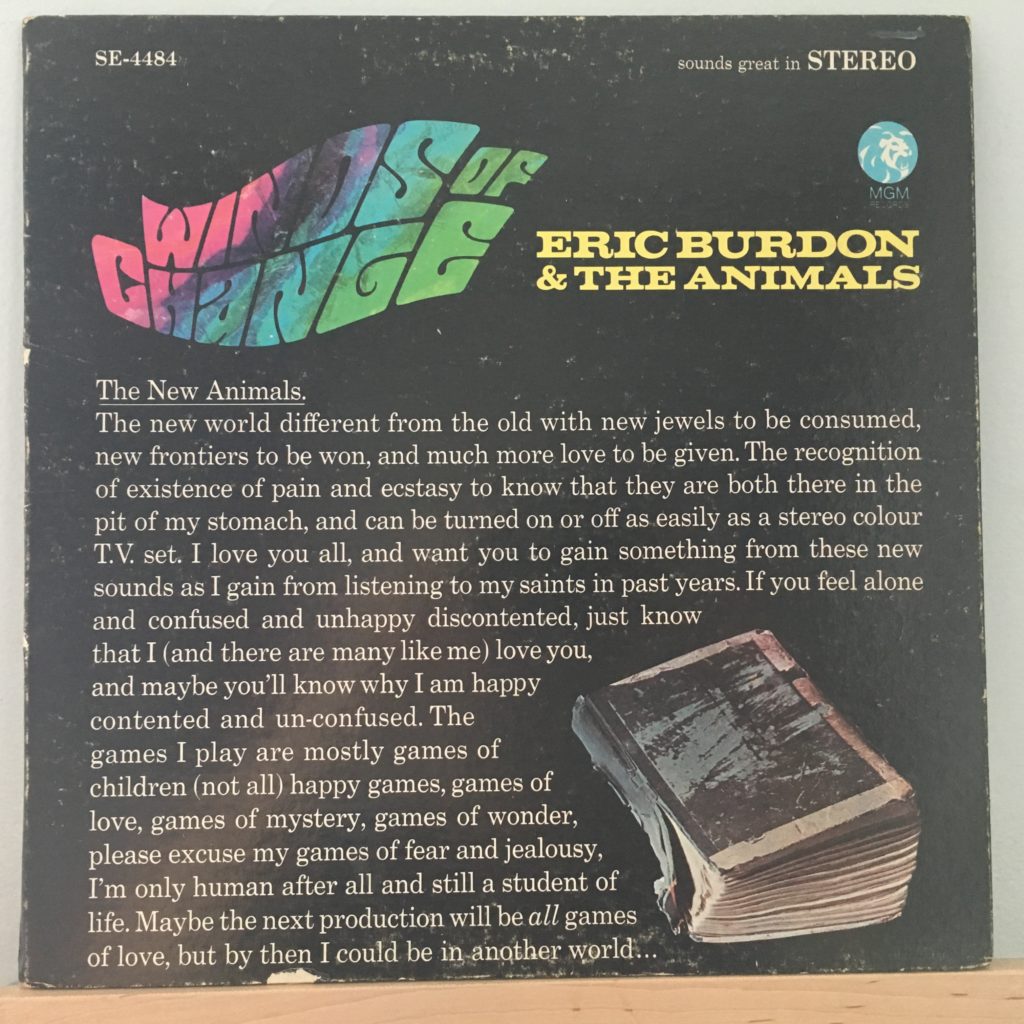
The album cover is the first tip-off that things are going somewhere new. It is just type design and a picture of an old, worn-out book, headlined “The New Animals.”
“The new world different from the old with new jewels to be consumed, new frontiers to be won, and much more love to be given. The recognition of existence of pain and ecstasy to know that they are both there in the pit of my stomach,aand can be turned on or off as easily as a stereo colour T.V. set. I love you all, and want you to gain something from these new sounds as I gain from listening to my saints in past years. If you feel alone and confused and unhappy discontented, just know that I (and there are many like me) love you, and maybe you’ll know why I am happy contented and un-confused. The games I play are mostly games of children (not all) happy games, games of love, games of mystery, games of wonder, please excuse my games of fear and jealousy, I’m only human after all and still a student of life. Maybe the next production will be all games of love, but by then I could be in another world…”
This was the cover of an album by a major band, on a major label. The gatefold inside was no less amazing, beginning with a long list of dedications that included President Johnson and Ho Chi Minh as well as three of the original Animals and “Eric The Head–the voice of Frisco.” On the right side of the gatefold, Eric The Animal (not Eric The Head) has written something like appreciations for each of the new members of the band, as well as producer Tom Wilson, and Terry McVay, their road manager.
“Many of you will not know or ever care, that a modern day group needs a road manager, to care after the equipment, mend it when it fails, argue with promoters, fix us up with chicks, but we known and care because he is part of our sound, and without him life would be a drag.”
Some of the rest of the appreciations – bassist Danny McCulloch “All man is Danny! . . . worships God, ketchup and home.” Drummer Barry Jenkins: “A good drummer, a good friend. A man. Good lover too! (My last friend told me).” Guitarist/pianist/vibraphonist Vic Briggs: “Inspects wine bottle and sighs heavily when it’s the wrong year, but drinks it anyway. Digs chicks like mad. Bit of a monster actually (but then ain’t we all).” And guitarist/violinist John Weider: “Jewish maniac. His Judaism only shows when he’s playing his violin or when money is being discussed.” Oy.
The Songs: Talking, Name-Dropping, Yelling Over Bongos
The songs themselves — well, let’s get ready for some nineteen-sixty-goddamn-seven. For starters, they could have called this one “Eric Is Here But This Time He’s Not Gonna Sing.” A huge portion of the record is far closer to speaking than singing. The album starts with “Winds of Change.” a dirgey name-drop meant to sound like raga through a violin.
(“And, oh my, how Billie Holiday could sing?
Alan Freed rock and rolled,
Joe Turner’s voice was very low
B.B. King wailed”).
It gets a little more rhythmic with Poem by the Sea, but the instrumentation is definitely on the trippy side.
Then there’s an absolutely raving cover of “Paint It Black,” a version that I have long preferred to The Stones version. Dig it:
Then, Eric goes full Sixties with “The Black Plague.” It’s a spoken piece over chant, telling a story of medieval plague:
the bell tolls
the black plague has struck
diseased eyes roll upwards
as if knowing which direction their souls will travel
(bring out your dead)
But it’s also a morality tale, as in the midst of the story are rich people in a stone castle who died because they were afraid to mix with the peasants. Or something. Because what I look for in my rock and roll is Gregorian chant and songs of death.
Then it gets weird, though perhaps a little less so, with “Yes I Am Experienced.” It’s pretty clear that this is a classic “answer song,” a response to Jimi Hendrix’s “Are You Experienced?” which had been released just months before. Oddly, again, it’s mostly spoken. Was Eric just tired of singing? Also oddly, this answer song was recorded before the song it was responding to had even been released. When you remember that Chas Chandler, from the original Animals, was Jimi’s manager, and The Animals’ manager Michael Jeffery was also backing Hendrix, and that Eric and Jimi were running in some of the same circles, it’s not surprising that Eric would know the song well before it was released.
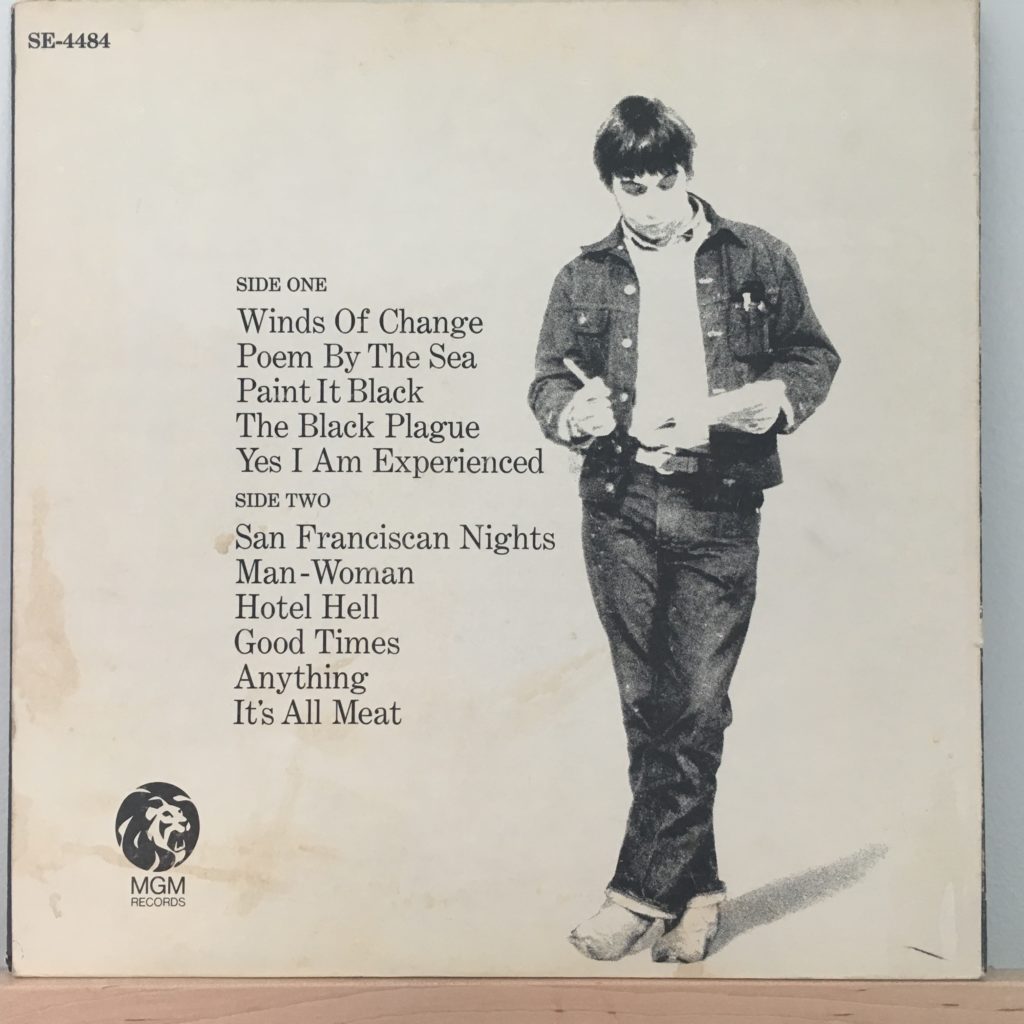
On the B side, we get to “San Franciscan Nights,” a single that reached No. 7 in the US and was perhaps the Animals song I knew best, other than “House of the Rising Sun,” before I started to dig into their music. It’s atmospheric, pretty, full of hippie nonsense, but still a good song. Then the record gets weird again, with “Man-Woman,” which can only be described as poetry about adultery shouted over bongos. Then “Hotel Hell,” again principally spoken, paints a picture of a bleak dark night, with some fabulous trumpet. “Good Times” is a bit of return to the novelty songs of “Eric Is Here,” meant to tell a cautionary tale of life spent wasted but coming across just a bit heavy. Then there’s the ballad “Anything,” which is simply lovely. And, unlike a lot of the album, Eric actually sings. It closes with “It’s All Meat,” a return to rhythm and blues, but man, more name-dropping and a little bit of self-righteous weirdness: “Don’t you listen to none of them jive hip squares / try to tell you where the blues is from / The blues is from the whole wide world / Deep within the souls of man”
I think I got this album around 1980, so I was 20ish. I loved it. I loved the cover that was bold enough to include only words. I loved the spoken word stuff. I loved the “song” about the black plague, and enjoyed moaning along to “Bring out your dead.” It loved it all. I not only loved it, I listened to it. A lot. I remember a spring semester in the Seneca Apartments, a once grand old apartment building that had become an SU dormitory, where this was played a lot. I really thought it was deep.
Now? Well, “San Franciscan Nights” is a classic, and their cover of “Paint It, Black” is still amazing. But the rest of it? Well, it’s a time capsule. It’s not bad, but it’s nothing you’d ordinarily want to listen to.
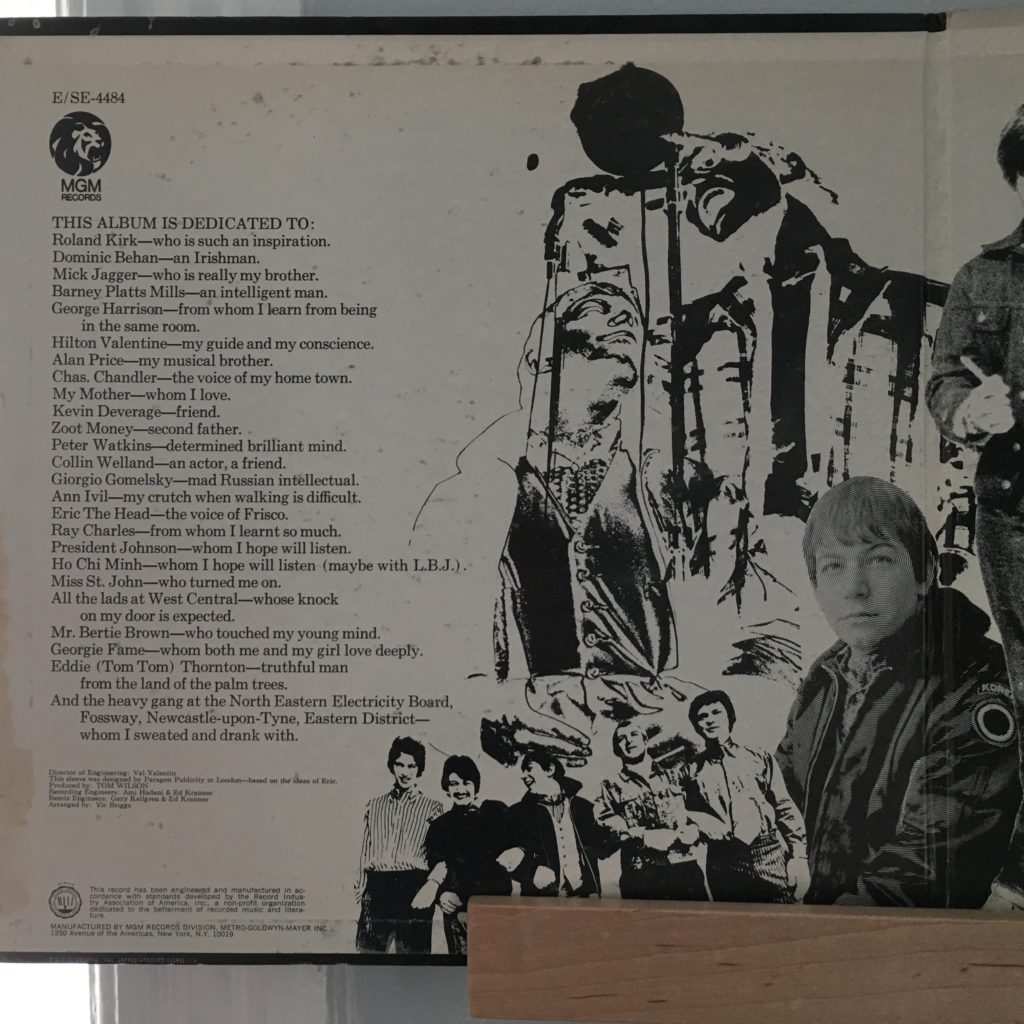

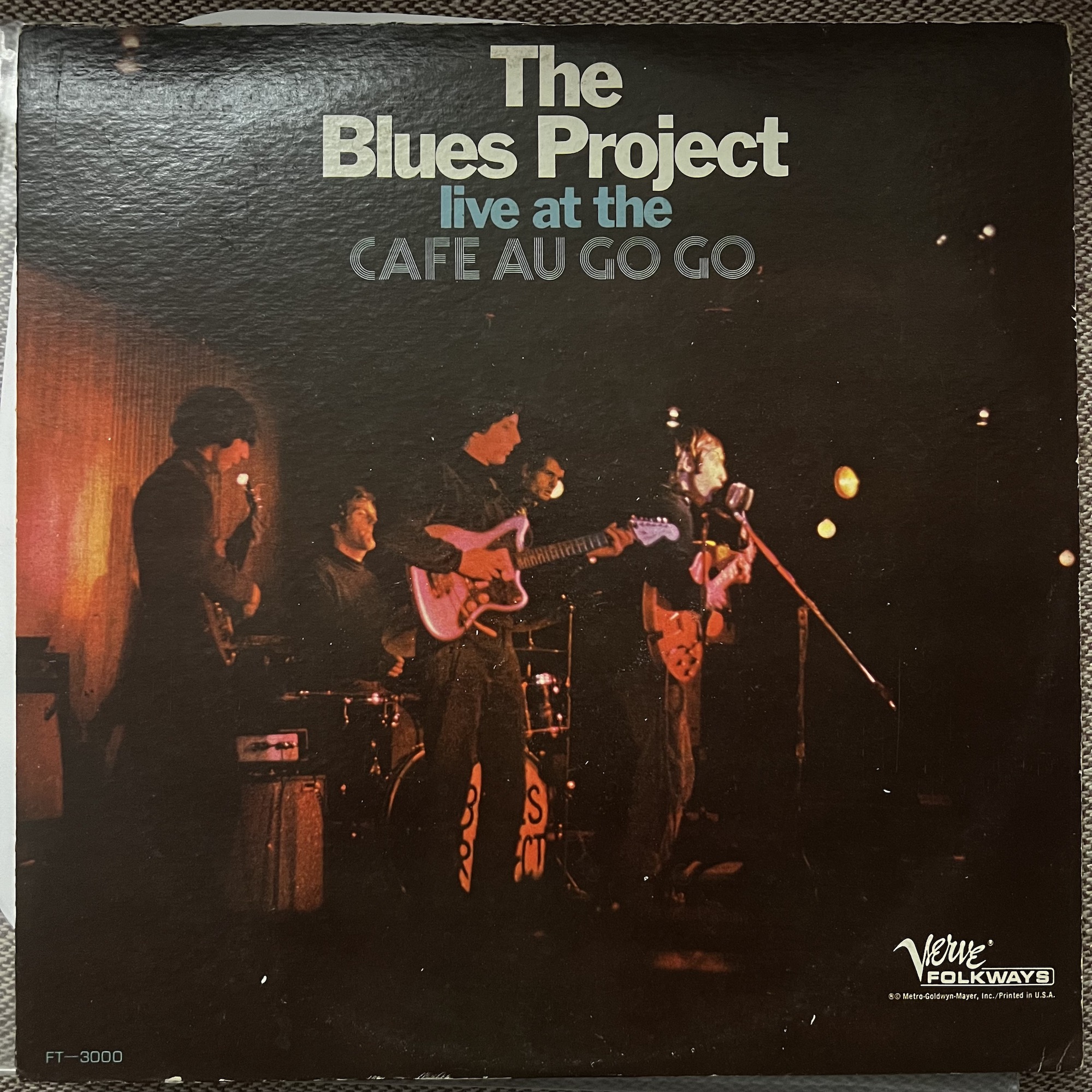
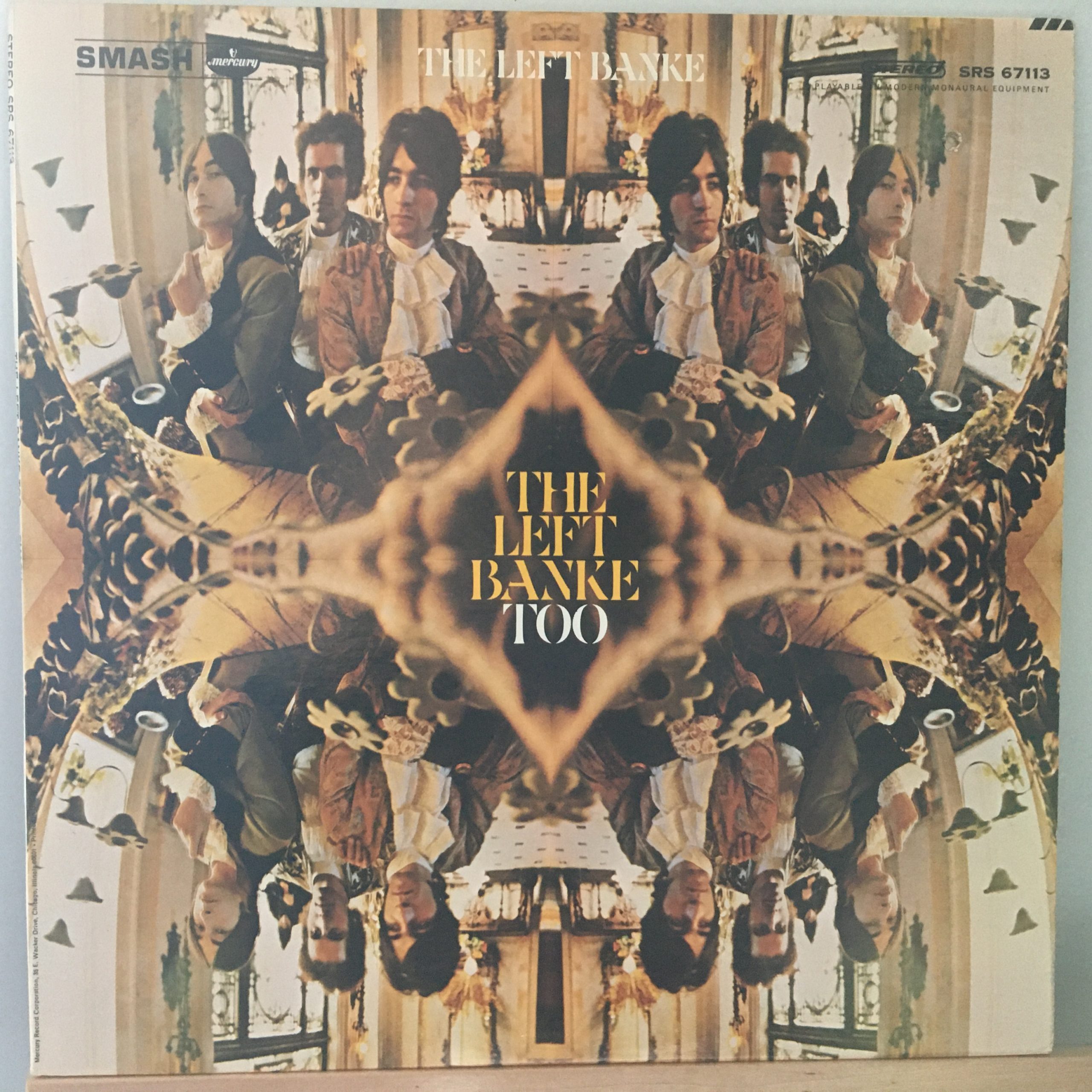
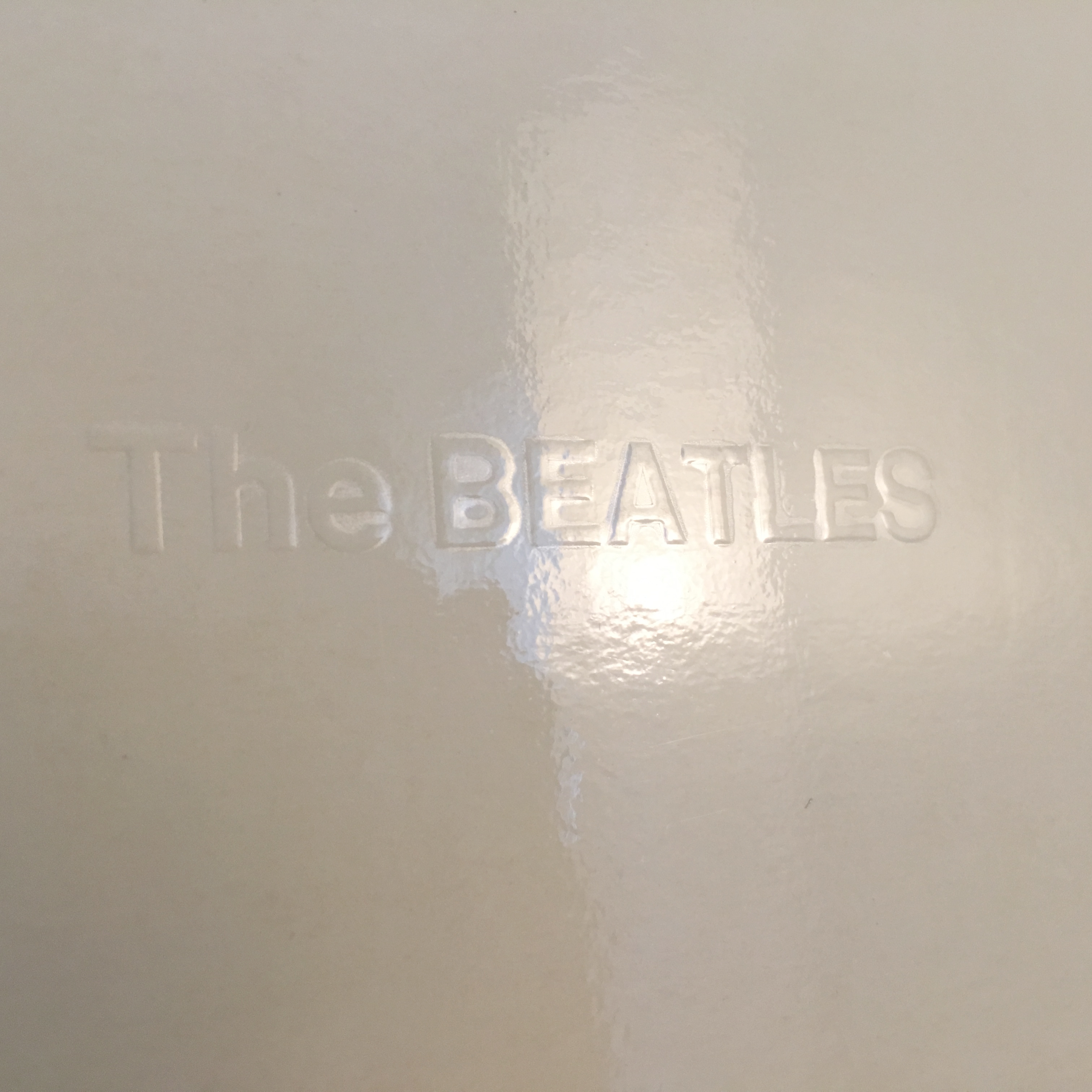
Hi, I just read your nice text on ”Winds of Change” by Eric Burdon & The Animals – great wiews!
Within the part on ”The Black Plague” you wrote
”Because what I look for in my rock and roll is Gregorian chant and songs of death.” Well that is exactly what I’m looking for myself! It seems like that theme ”was in the air” in the late 60’s, for instance ”Mass in F Minor” by Electric Prunes, etc.
My question is; do you have any kind of list of that kind of music from that specific era? It would be great to discover to me unknown pieces!
All the best!
Anders Henning (from Stockholm, Sweden)
Anders, the first song that springs to mind is “Still I’m Sad,” by The Yardbirds, which carries a pretty heavy chant vibe. Beyond that I don’t really have a list. But you’re right, that kind of experimentation was definitely in the air at the time.